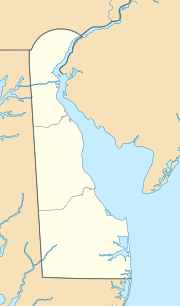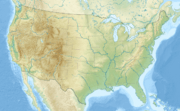Cherry Walk Creek (Love Creek tributary) facts for kids
Quick facts for kids Cherry Walk Creek |
|
|---|---|
| Other name(s) | Tributary to Love Creek |
| Country | United States |
| State | Delaware |
| County | Sussex |
| Physical characteristics | |
| Main source | Sarah Run divide pond at Camp Arrowhead Road 5 ft (1.5 m) 38°40′56″N 075°09′54″W / 38.68222°N 75.16500°W |
| River mouth | Love Creek about 0.5 miles north of Joy Beach, Delaware 0 ft (0 m) 38°41′16″N 075°08′41″W / 38.68778°N 75.14472°W |
| Length | 1.45 mi (2.33 km) |
| Basin features | |
| Progression | southeast then northeast |
| River system | Rehoboth Bay |
| Basin size | 1.05 square miles (2.7 km2) |
| Tributaries |
|
| Bridges | Camp Arrowhead Road Waterview Road |
Cherry Walk Creek is a small stream, about 1.45 miles (2.33 km) long. It's like a smaller helper stream, also called a tributary, that flows into a bigger one called Love Creek. You can find it in Sussex County, Delaware, in the United States.
When we say Cherry Walk Creek is a "first order" stream, it means it starts from its own source. It doesn't have any other streams flowing into it before it joins Love Creek.
Where Does Cherry Walk Creek Start and End?
Cherry Walk Creek begins in Sussex County, Delaware. It starts near a place called the Sarah Run divide. A "divide" is like a high point in the land that separates where water flows.
From its start, the creek first flows towards the southeast. Then, it changes direction and flows towards the northeast. Finally, Cherry Walk Creek meets Love Creek. This meeting point is about 0.5 miles (0.8 km) north of a place called Joy Beach.
What Is the Cherry Walk Creek Watershed Like?
A watershed is an area of land where all the water drains into a single stream, river, or lake. The Cherry Walk Creek watershed covers about 1.05 square miles (2.72 sq km). This means all the rain that falls in this area will eventually flow into Cherry Walk Creek.
The area around Cherry Walk Creek gets a good amount of rain, about 45.3 inches (1,151 mm) every year. A large part of this watershed, about 40.4%, is covered by forests. These forests are important because they help keep the water clean and provide homes for wildlife.
The watershed also has a "topographic wetness index" of 569.18. This number helps scientists understand how wet the land is and how water moves across it. A higher number usually means the area is wetter.
 | Misty Copeland |
 | Raven Wilkinson |
 | Debra Austin |
 | Aesha Ash |



